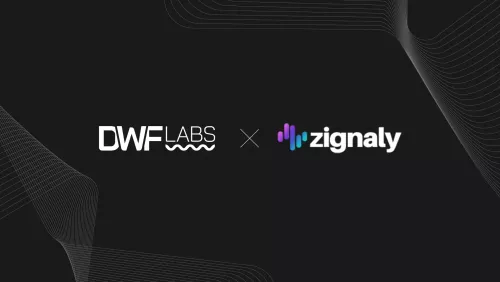Virtuals Protocol’s native cryptocurrency, VIRTUAL, doubled in price during the second two weeks of April 2025, following the launch of Genesis — a new token distribution mechanism designed to provide fair and transparent access to AI agent tokens.
This research, prepared by the DWF Ventures team, outlines the fundamentals of Virtuals Protocol, explains how the Genesis mechanism works, and highlights its key features. Let’s dive in.
What is Virtuals Protocol: Quick Background
Virtuals Protocol is a decentralised AI agent infrastructure, created on the Base blockchain, an Ethereum Layer 2, and later integrated with Solana to benefit from faster transaction speeds and broader user access.
The protocol gained traction in late 2024, coinciding with a broader rise in interest around AI agents within the crypto space. By leveraging blockchain networks, Virtuals enables tokenisation of AI agents, allowing for shared ownership and on-chain interaction in a permissionless environment.
As interest in AI agents grew, so did the need for a more equitable way to launch and distribute their tokens — leading to the introduction of a new mechanism within the Virtuals ecosystem.
Genesis: New Token Distribution Mechanism
In April 2025, Virtuals Protocol introduced Genesis, a new token distribution mechanism, designed specifically for launching new AI agent tokens in a fair, permissionless manner. It was built to ensure fair, permissionless participation and to address common issues seen in traditional token sales.
Rather than favouring insiders or automated bots, Genesis is designed to prioritise genuine contributors. By removing the usual points of manipulation, like early access for well-connected investors or fast-trading snipers, the mechanism shifts focus to meaningful participation in the ecosystem.
In Genesis, allocation is not determined by crypto capital or speed, but by activity and involvement. By replacing the bonding curve, the new mechanism uses a system of decentralized contribution that rewards users based on their actual participation in a launching project, which is tracked through so-called Virgen Points and VIRTUAL tokens.
As a result of implementing the new model, engagement on Virtuals had risen dramatically. By early May 2025, over 8,300 unique addresses had interacted with Genesis, accounting for 18,900 transactions — with activity peaking at 2,274 transactions on May 5.
Genesis in Virtual Protocol: Key Features and Updates
Genesis introduces several innovative features that distinguish it from traditional token launchpads.
Rewarding Real Contributors
Rather than a typical first-come, first-served sale or a pure lottery, Genesis uses a proof-of-contribution system. Users earn points by contributing to the ecosystem, and those points determine their share of a new token sale. This ensures that allocations are based on actual community merit: active supporters (not just early insiders or bots) get rewarded with access.
Point-Based Access
Participants pledge points to compete for a share of the 37.5% presale token allocation. The more points pledged, the higher the maximum allocation potential. The point system makes Genesis effectively permissionless yet merit-based: anyone can earn points, and thereby anyone can get in, but only genuine participation yields points.
Transparent Allocation
To prevent any single player from monopolising a launch, Genesis caps each wallet to a maximum of 0.5% of the new token’s total supply. This cap is critical for fairness: even if a user has tons of points, he can’t exceed that allocation. All calculations of who gets what are done openly and algorithmically, based on the pool of points contributed. Such transparency and enforced distribution limits help avoid the scenario where a few insiders walk away with most tokens.
Developer Vesting
Project teams can lock their tokens on a vesting schedule visible to all participants. This builds trust and aligns long-term incentives between developers and the community. In practice, this means that, when a project uses Genesis, creators can choose to lock a portion of their token allocation on a schedule.
Diamond Hand Bonus and Cooldown
Holding tokens after launch earns bonus points every 24 hours. If a user sells early, a cooldown is triggered, temporarily reducing their point power for future launches.
Refund Guarantee
Genesis includes a built-in refund mechanism to reduce participation risk. If a launch does not meet the minimum threshold. For example, fewer than 42,425 VIRTUAL tokens are subscribed, and all committed funds are automatically refunded. Similarly, if a user pledges more than needed for their final allocation, the excess amount is returned. This ensures participants only pay for what they receive, and helps avoid common issues seen in traditional token sales, where oversubscription or failed launches can result in lost funds or complicated refund processes.
Community Predictions
With high engagement, Genesis has sparked growing interest across the crypto community. Users have begun analysing launch outcomes — comparing point contributions to token allocations and estimating potential return on investment (ROI) based on project valuations at token generation event (TGE). These grassroots evaluations reflect a deeper understanding of the Genesis model and its implications for future launches.
Meanwhile, on May 8, Virtuals Protocol has hinted at an upcoming major announcement, suggesting there’s more on the horizon. As the ecosystem evolves, Virtuals’s Genesis has been setting a new standard for fair and transparent cryptocurrency distribution, and the next phase may be just around the corner.
At DWF Ventures, we continue to closely monitor the decentralised AI space and see strong potential in protocols such as Virtuals Protocol, remaining interested in projects building AI-native infrastructure. If you’re a founder working in this sector, feel free to reach out to our crypto venture capital firm.



